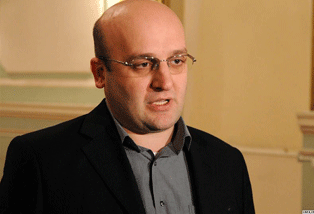Tazo Kupreishvili, netgazeti
Georgian parliament is discussing amendments to the Criminal Code of Georgia. According to the amendments, the law will get stricter about creation of illegal formations, for the attack on police officer or public official and for hiding the property in order to avoid tax payment.
Pavle Kublashvili from the parliamentary majority believes “if anybody in this country wishes to attack a police officer, police office, he will commit much graver crime than assault on an MP.”
Chair of the legal committee of the parliament made the statement on June 21 at the session when the amendments were adopted at the first hearing.
On June 21, MP Giorgi Chiviashvili presented the draft-law to the Parliament of Georgia. The amendments were to be introduced to four articles of the Criminal Code; two of them will have technical character and two new norms will be added to the Code.
Old edition of the Article 202 of the Criminal Code of Georgia contained term “armed”; the term was removed from the draft-law and “creation, membership or funding of illegal formations” is used instead.
The same article clarifies the “armament” and states “any equipment or subject that can be used for the damage or for devastation of live or other targets.”
As for Article 225, the acting edition states that “Organizing or leading of mass disorder which involves violence, pogrom, arson, use of arms or explosive device or armed resistance against government representative, shall be punishable.”
In accordance to the draft-law offered by the government, article 353' shall be added to the code which envisages “assault on a police officer, or a public official and public institution.” The article contains two parts; the first one is about the assault on a public official in regard to his/her professional activities that is punishable with imprisonment from 4 to 6 years; but if the assault results into a death of a victim, the crimes is punished by imprisonment from 7 to 20 years or by life imprisonment.
A new norm will be added to the Criminal Code –article 205' which envisages punishment for the following crime: “hiding property by apparition or hypocritical deals.” If a director hides property in an enterprise or in the organization “by apparition or hypocritically” in order to avoid tax payment, s/he will be fined, or punished by socially useful labor for up to 150 or 200 working hours; or by corrective labor for up to two years or by imprisonment from 2 to 4 years.
Parliamentary opposition was critical about the draft-law during the parliamentary session. Jondi Bagaturia evaluated the statements of the government about “liberalization of the criminal law” as “false talks”.
“Organized activity is a dangerous definition because 4-5 people might gather and then they might be punished under that very grave article. It is inadequate punishment and directly aims to arrest people on political grounds because hooliganism is already punished by the law,” said Jondi Bagaturia.
Levan Vepkhvadze from the Christian-Democrat Movement asked the presenter of the draft-law “who is meant under the notion “other governmental official” – all 80 000 public officials in Georgia with their family members or only those who implement forced labor (examination, search, etc).
MP Giorgi Chiviashvili replied to him that the new drat-law really envisages crimes committed against all governmental officials and their family members. However, the prosecutor shall have to prove that the assault was result of the victim’s professional activities.
“We should rather use term “Shepitsulis” (formation created by the opposition party) instead “army” or “unit” in the draft-law. I am sure, this article was added to the draft-law after the events of May 26 (protest demonstration of the People’s Assembly was dispersed by riot police) and you should directly write in the law, what you in fact want to do. Write “Shepitsuli” in it and we will clearly know why you are doing it,” said Levan Vepkhvadze.
MPs from opposition parties also wondered why the government makes the punishment for the assault on a police officer stricter and why a new norm is added to the law while the crime is also punished by the old edition of the Criminal Code.
MP Pavle Kublashvili said at the session. “If anybody in this country wishes to assault a police officer, police station – it will be much graver crime than assault on the MP.”
Head of Georgian Young Lawyers’ Association Tamar Chugoshvili evaluated the draft-law presented by the parliament and said:
“When the law clarifies the illegal formations, we think the possible threat from that formation shall be underlined. We think, one sentence shall be added to the article: “illegal formation that might destroy public order.” It means, when a prosecutor launches legal prosecution under the article, they will have to prove that the formation aimed to destroy public order. If the formation does not have similar purpose, the prosecution shall not be launched.”
Chugoshvili also spoke about the new norm which makes the punishment for the assault on a police officer stricter. “We think the principle of proportionality is important in the law. If a police officer is assaulted, the judge will have to choose punishment from a very serious starting point – seven-year imprisonment up to life imprisonment. However, the police officer might have minor injuries as a result of the assault.”
The head of the GYLA believes that the main problem in the draft-law is violation of the principle of proportionality.
Original text




